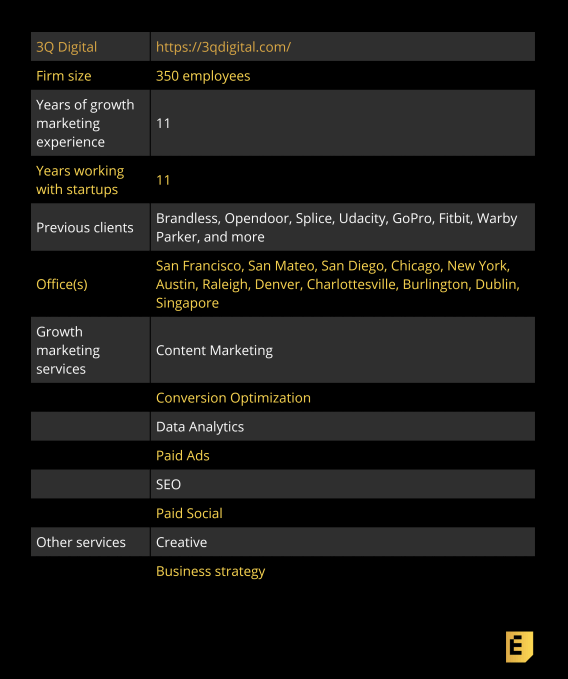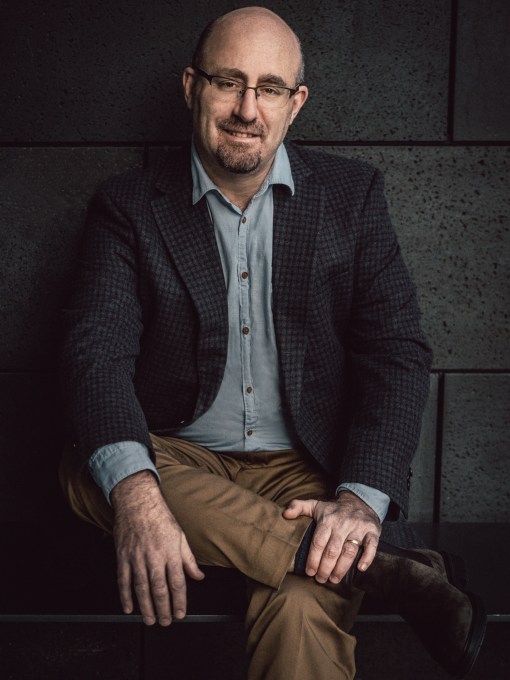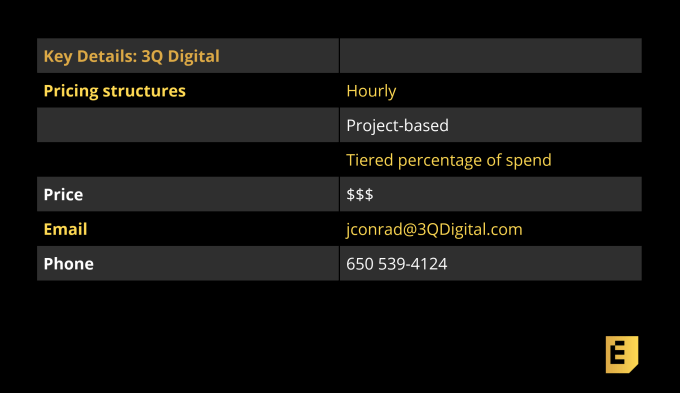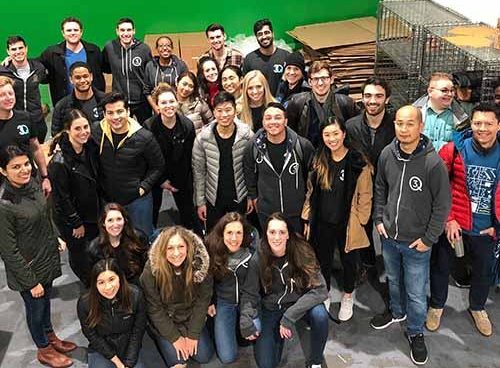With 12 offices and 350 employees around the world, 3Q Digital is a giant among growth marketing agencies. They’ve worked with companies like Brandless, Opendoor, and Warby Parker, but they also have an internal business unit called 3Q Incubate to work with startups in their pre-launch phase. 3Q Digital gets tech and that’s a testament to CEO and founder David Rodnitzky’s early days as a one-man growth marketing consulting practice in 2008. Learn more about 3Q Digital’s approach to growth, their ideal client, and more.
“I’ve used them at 3 companies – 2 of which were small startups with minimal prior paid investment. In those cases, they helped me build our entire performance marketing foundation…” Matt O' Day, SF, Head of Performance Marketing and Analytics, Rylo Inc
3Q Digital’s approach to growth
“As far as our own focus, we’re a performance agency founded on a bedrock of SEM and paid social; as the digital landscape has grown and expanded (channels, skills, services), so have we, but we continue to have a reputation as one of the best online performance marketing agencies around.”
David’s proudest accomplishment
“We’ve not only survived in Silicon Valley for 11 years, we’ve grown massively. We are one of the largest performance marketing agencies in the San Francisco Bay Area, with over 100 people locally. We continue to get referrals from founders who used us for their first start-up and now have come back to us for their second or third. The same is true for many venture capital partners who rely on us again and again.”

Below, you’ll find the rest of the founder reviews, the full interview, and more details like pricing and fee structures. This profile is part of our ongoing series covering startup growth marketing agencies with whom founders love to work, based on this survey and our own research. The survey is open indefinitely, so please fill it out if you haven’t already.
Q&A with 3Q Digital CEO & Founder David Rodnitzky

Yvonne Leow: How did you become a growth marketer and start working with tech startups?
David Rodnitzky: I moved to San Francisco in 1999 after graduating from law school in my home state of Iowa. In early 2000, I got a job at a Softbank — a Sequoia-backed SaaS startup as “manager of strategy.” I quickly realized that no one was running marketing, so I volunteered.
After spending $50K/month on PR and branding agencies, I discovered pay-per-click advertising via GoTo.com. I was immediately hooked by the measurability and ROI, and spent the next seven years working at Silicon Valley start-ups with a focus on measurable online marketing.
In 2008, I decided to set up a consulting practice out of a coffee shop in Pacifica. My reputation for driving very high ROI resulted in numerous venture firms reaching out and asking me to help with their portfolio companies. Early success stories included Fitbit, GoPro, Dropcam (now Nest), SunRun, and 23andMe.
Yvonne Leow: Describe 3Q Digital’s approach to growth marketing. What makes your agency unique?
David Rodnitzky: We’re unique because of how and where we started: in Silicon Valley, where everyone is hungry for growth and willing to test everything and adapt quickly to achieve it and agencies had to espouse those values to be true partners to their clients.
Because of where we are and how we worked, we were able to quickly build networks with many fast-moving companies; we’ve worked with many of Silicon Valley’s famous unicorns and continue to drive most new business from referrals.
Yvonne Leow: What’s the most common mistake you think founders make when it comes to growth?
David Rodnitzky: Startup founders are often drawn to the concept of “growth hacking,” whereby a couple of smart engineers come up with either a product or marketing hack that costs next to nothing and drives massive scale (the classic example: AirBnB hacking Craigslist vacation rental listings).
Growth hacking is awesome, but it is also highly speculative. Companies that bet their growth on growth hacking are similar to investors who put all of their investments into junk bonds and options trading: 1 in 100 of these investors will be wildly successful; the other 99 will go broke.
As such, we believe that smart start-ups need to allocate time and resources to growth hacking projects but also need to invest in professional marketing. Both are effective, but with different risk/return ratios.
Yvonne Leow: Does your agency specialize in any particular industry or focus?
David Rodnitzky: No particular industry, though we’ve been successful in working with clients in SaaS, FinTech, eCommerce, and especially digital media. As far as our own focus, we’re a performance agency founded on a bedrock of SEM and paid social; as the digital landscape has grown and expanded (channels, skills, services), so have we, but we continue to have a reputation as one of the best online performance marketing agencies around.

Yvonne Leow: Who is your ideal client?
David Rodnitzky: Our ideal client is a fast-growing business with a willingness to test and collaborate in the name of finding and pursuing all avenues of growth. We’ve had great partnerships with clients who have raised 1-3 rounds of funding and need our expertise on where to invest it most effectively in the digital landscape. We work best with clients who rely on data, particularly data that is focused on performance.
We have actually set up three business units inside 3Q:
- 3Q Incubate – for companies that are pre-launch or have received seed funding
- 3Q Accelerate – for companies who have figured out product-market fit and are generally in Series A and B rounds
- 3Q Digital, our flagship service, for enterprise-scale marketing budgets, typically Series C to large public companies.
Yvonne Leow: Walk me through a successful growth campaign and what you learned from the experience.
David Rodnitzky: We began work with Brandless, a new-to-market CPG company, before they launched. Our first goal was to help identify customer attributes of people with a high likelihood of becoming loyal Brandless customers; we used a variety of tactics for audience testing including email capture tests, pre-launch waitlist tests, 3rd-party lists, lookalike audiences, and ad copy tests.
From there, we established a marketing foundation that included:
- SEO and website infrastructure
- Measurement and tracking plan
- Technology enablement
- Market research and launched surveys to establish a target audience
- Profiles detailed “who they are, what they care about and why” – motivations, decision criteria, barriers, etc.
- Total addressable market estimate
- Once we identified the target customer (geo, demo, psychographics), we layered those insights into Facebook’s volume prediction tools. Knowing that 88% of the U.S. market was on Facebook at the time, we used a multiplier on their estimates to get the total addressable market in the US
- Competitor research – not only to understand the landscape, but also to borrow/test tactics from similar business models (i.e. Dollar Shave Club)
- Comprehensive pricing optimization – everything cost $3, so we helped Brandless understand how much customers were willing to pay for shipping, subscription models, bundles, etc.
- UX – designing and optimizing the end-to-end on-site experience
The next phases of launch and growth included:
In-market Testing
- Launched paid social campaign to capture emails and establish customer base
- Tested messaging and persona hypotheses in market
- Grew pre-launch waitlist acquisition
- Built out ad campaigns
Product Launch
- User journey-aligned media mix that used paid media to support earned media
- Paid Search / SEO
- Paid Social
- Display
- Native Ads
- Video
Continued Growth
- Built out customer journey
- Gathered audience insights from our third-party data management platform
- Established media attribution
- Implemented conversion rate optimization strategy
- Incorporated retention and lifecycle marketing
Our work with Brandless produced a successful product launch with massive amount of organic and earned traffic – over 2.2M unique users in the initial growth phases. In the process, we learned the importance of mobile in the modern e-commerce customer journey; 66% of our site and campaign sessions came from mobile, and high mobile shopping cart abandonment rates limited the brand’s ability to scale mobile campaigns. Our biggest media-mix lesson was how much to pull back on brand-focused paid search spend once SEO listings were optimized.
Yvonne Leow: What’s your process for developing a growth marketing strategy?
David Rodnitzky: Our process is a seven-phase roadmap.
- It starts with identifying and establishing the right KPIs that will determine success. We should end with goals, objectives, and ideally budgets that will determine what is achievable.
- From there, we move to the research phase, which involves customer, competitor and market research. We end with an understanding of who the target customer is, where we can find them, what experience they are looking for, and what would increase their lifetime value.
- Phase three is measurement planning. We need to have an agreed-upon metric that is consistent across media channels and accounts for the phase of the funnel where the marketing is being done. The goal in the upper- and mid-funnel should be to push potential targets down the funnel; from there, we use performance media to capture the demand created.
- Next is media planning: choosing optimal media channels and allocating budget accordingly. This will be a process that is optimized over time.
- The fifth phase is around creative and messaging. We want to apply consistent messaging across channels but make sure to optimize the messaging depending on the target audience and the phase of the customer journey the users are in.
- Sixth is the enablement of technology: identifying what platforms need to be adopted to more intelligently purchase, measure, deliver, optimize, and report against our marketing campaigns.
- Last is execution and analysis: making sure we have clean data coming into the system that allows for quality insights that can improve the marketing efforts over time.
Yvonne Leow: What can entrepreneurs expect when they collaborate with your agency?
David Rodnitzky: They can expect transparency and honest feedback along with a commitment to work as if the client’s success is our own (since it very much is). Our experts will push back on a client’s ideas or practices if we think there are better alternatives; for entrepreneurs, especially in the early stages, course correction is one of the most valuable services we can provide.
Given the breadth and depth of our experience, entrepreneurs can use us as a one-stop-shop for growth. From user research, data capture and activation, to creative, organic traffic, and media buying – we have experts who work together to help entrepreneurs quickly and efficiently scale.
Yvonne Leow: Since starting your agency, what has been your proudest accomplishment?
David Rodnitzky: Silicon Valley is a small valley. Agencies that can’t move at the speed of Silicon Valley and deliver above-average returns quickly die. To wit: many of the largest agencies in the world have opened offices in the San Francisco Bay Area with much bravado and a few short years later have left town with their tails between their legs.
We’ve not only survived in Silicon Valley for 11 years, we’ve grown massively. We are one of the largest performance marketing agencies in the San Francisco Bay Area, with over 100 people locally. We continue to get referrals from founders who used us for their first start-up and now have come back to us for their second or third. The same is true for many venture capital partners who rely on us again and again.
We’re really proud that our work has been validated by Silicon Valley in a way that no other agency’s work has.
Yvonne Leow: How do you charge early-stage startups? What’s your rate and fee structure?
David Rodnitzky: For media management, we charge early-stage startups a minimum monthly fee or % of spend fee, whichever is greater; the percentage decreases as ad spend increases. We understand startups have limited marketing budgets, so we want to make sure our fees are competitive but also allow us to deliver high-quality service with an emphasis on performance goals.
Many startups also rely on us for SEO, landing page optimization, analytics and data science, creative, and user research. For these services, we typically charge on an hourly basis.
Yvonne Leow: Should founders have different growth marketing strategies for US versus international markets? Have you observed different approaches to growth?
David Rodnitzky: This really depends on several factors. For example, If one is trying to market in a region/country where there is less brand awareness, the tactics will need to be different until the brand has been established. It will also depend on the competitive set and the most important media channels in that region. Ideally, the seven-phase approach applied above will be done for each new market where meaningful marketing activity will take place.
Founder Recommendations
“I’ve used them at 3 companies – 2 of which were small startups with minimal prior paid investment. In those cases, they helped me build our entire performance marketing foundation: from setting up attribution tech and dashboards, to conducting primary research, to managing and optimizing our spend. They set us up to scale with the flexibility to take on tasks and answer questions that wouldn’t be realistic with a very small internal team.” – Matt O’ Day, SF, Head of Performance Marketing + Analytics, Rylo Inc
“Very organized. High level of positive energy and attention for a startup, despite a lower level of spend overall. Helped build out our paid social and other channels from scratch.” – VP of Marketing in SF
“Our team at 3Q truly goes above and beyond to succeed for our business. Our support team there consistently grows in order to support our needs. The team spends a great deal of time testing, building, and optimizing our thousands of paid search and across multiple accounts, and they continue to drive a more efficient bottom line for us (marketing qualified leads, meetings, and cost per meeting) quarter over quarter. I recommend 3Q with my highest regard.” – Digital Marketing Manager in San Jose, CA
“They manage our paid ad campaigns across multiple channels and do a damn good job!” – Senior Digital Marketing Specialist in San Diego, CA
“Paid media management and account optimization, in-depth strategic insight.” Casey Wolter, NYC, Digital Marketing Manager, Bynder
“3Q set-up and scaled our Paid Social program. They are great at testing, looking at data, and optimizing campaigns. They are a great thought partner on how we should continuously grow our program and bring nuanced channel insights.” – Jai Singh, SF, VP of Growth, Womply
“3Q has allowed us to scale our web presence from both a paid and organic standpoint. From scaling our PPC efforts to fixing our technical SEO and then having that same person having the knowledge to help us with content SEO, 3Q is truly a full-service agency that delivers results.” – Sam Kuehnle, Charleston, SC, Senior Digital Marketing Manager, Blackbaud

